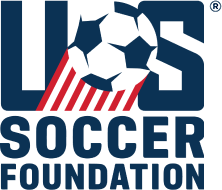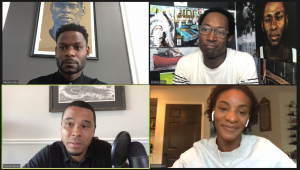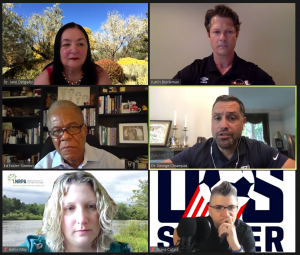

This year’s Soccer for Success National Training looked a bit different than previous summers. Instead of an in-person event hosted in Washington, D.C. to prepare coaches to lead Soccer for Success trainings in their communities, this year’s event was held virtually. The event also featured sessions open to the public to help organizations as they plan to safely return to play and what youth sports this fall might look like given the current pandemic.
The theme of the event “Reimagining Youth Sports,” set the tone for the three-day, virtual event, which featured three star-studded panels, breakout sessions on relevant topics—including how to connect with players in a virtual setting and how to talk to your players about race—as well as a virtual local trainings for Soccer for Success coach-mentors who will lead the Foundation’s virtual and in-person, socially-distanced Soccer for Success offerings this fall.
The event kicked off with a plenary session featuring Olympic Gold Medalist and Women’s World Cup Champion Sydney Leroux Dwyer and WNBA Champion Natasha Cloud, who shared their personal experiences as women of color in professional sports. They also provided attendees with new ways to think about resilience.
Leroux Dwyer talked about when her family moved to Arizona from Canada, saying, “I always felt different, because no one looked like me.” But her mother encouraged her to keep going because “things would be different” when she went to college, which she found to be true. That is, until she went back to Canada to play in a match. “There were racist things taking place during the game. And I said something. But when I said something, no one believed me.”

But with the rise of the Black Lives Matter movement and the national discussion now taking place, Leroux Dwyer says, “this moment doesn’t feel great,” but it is validating that “what I felt for all of those years is real.”
Cloud, who grew up in an all-white family where she never felt “Black enough or white enough” said acknowledging racial and gender inequities is the first step. As for the next, Cloud said, “Our main focus this time is voting…making sure that we’re educated and understand the power our votes have.”
For more, read the recap blog on this discussion.
The next session of the day featured Whittney Barnes and Rebecca Roulier, who gave attendees tangible tools from the morning’s panel and informed the audience about the importance of coaching through a trauma-informed lens. As all young people across the country live through a collective trauma, they talked about tangible ways to evaluate and help address the systemic roots of trauma in communities of color as they relate to institutional barriers.
Moderated by ESPN host and commentator Clinton Yates, Friday began with a plenary session featuring soccer stars Charlie Davies, Crystal Dunn, and Maurice Edu for a conversation on combatting racism in soccer.
All three players stressed that racism in sports and in society is not exclusively an American phenomenon.
“Racism is a global thing,” observed Edu, an American player of Nigerian heritage who played professionally in Scotland. He referenced high-visibility controversies in Europe in which Black players have suffered racist taunts at matches. Too often, those incidents are not taken seriously by leadership, including team owners, he said.
But that is changing as more white players stand up for their Black team members and against racism, Edu said.
“It’s a collective effort. That’s how you start to get significant change,” he said. “We have the power to enact change if we are together.”

Dunn echoed the other panelists.
“If we stand together, we can show we are powerful,” she said. “This movement – it’s not just Black people, it’s everyone… Enough is enough. The days of letting things slide are gone.” And that means white teammates and leadership have to confront racism too: “We need our white teammates… It’s everyone getting involved.”
For more, read the recap blog on this session.
Following Friday morning’s panel, Amber Coleman-Mortley, Director of Social Engagement for iCivics gave attendees tools on how to support athletes, particularly Black and non-Black athletes of color, in their quest for a more just and equitable world. In this session, Coleman-Mortley discussed where activism, social justice, and anti-racism show up in sports and the ways that coaches can authentically encourage social justice and activism on their teams.
For the rest of the afternoon, attendees were able to participate in two of 18 total breakout sessions, whose topics ranged from teaching soccer tactics in a variety of nontraditional settings to anti-racist coaching to building mental toughness.
On the final day of the event, participants heard from Soccer Shots CEO Justin Bredeman, U.S. Soccer Federation Chief Medical Officer Dr. George Chiampas, President and Chief Executive Officer of the National Alliance for Hispanic Health Dr. Jane Delgado, National Recreation and Park Association’s Vice President of Programs and Partnerships Kellie May, and U.S. Soccer Foundation President & CEO Ed Foster-Simeon in a conversation about how to ensure health equity in return to play.
“If this moment in time doesn’t highlight the importance of physical activity for the social and emotional health of kids, then we’re failing them,” said Dr. Chiampas. “It’s important for us as leaders to highlight to public health officials the importance of physical health activity. We have to all sit down together and make a really scientific and educated decision for the health and safety of our youth.”

Dr. Delgado stressed that we have the opportunity to reset. She said that we need to think beyond the next few months and beyond the cleaning precautions. “Children need interaction. They need to be social in body, mind, and spirit,” she said. “It’s all together. That’s what health is. We can’t compartmentalize it. We need to integrate it.”
For more on this session, check out the recap blog here.
On Thursday and Saturday, Soccer for Success coach-mentors from across the country also had the opportunity to attend a virtual training where they were guided on the U.S. Soccer Foundation’s new Soccer for Success curriculum. To address the ever-changing landscape presented by COVID-19, the Foundation has created 36 Soccer for Success sessions (three times per week for a 12-week season) that can be delivered via pre-recorded videos, live virtual sessions, in-person socially distanced, or through the traditional team approach. Partners have the flexibility to engage their players at any level so that consistent programming can be delivered throughout the season regardless of what stage of reopening each partner organization is in. In total, more than 360 coach-mentors attended the training in preparation for the fall season.